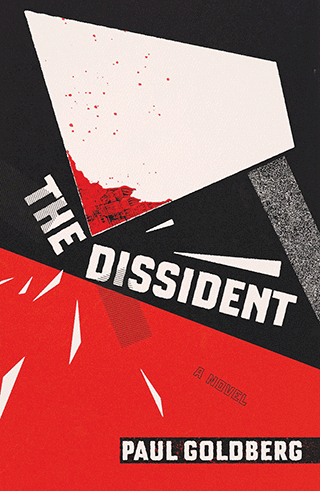Reviewed by NEAL GENDLER
Refusenik Viktor Moroz was spotted leaving the scene of a grisly double ax murder, and the KGB has given him seven days to find the killer or be put on trial for the killings.
Why the deadline?
One of the dead — killed in bed beneath a refusenik friend of Viktor — is U.S. diplomat Alan Foxman. The Russians want a killer arrested before Secretary of State Henry Kissinger arrives for talks in Moscow. In The Dissident, Paul Goldberg’s complex, detailed, engaging third comic novel, set in mid-1970s Moscow, Viktor is an engineer who loves Oksana Moskvina. She’s a professor ’s daughter — she’s well educated, well-read and enmeshed in samizdat (typewriter-copied underground papers) and has decided she’s Jewish despite lacking the prerequisites.
The story begins with dissidents and refuseniks — Soviet Jews refused permission to emigrate — gathered for Viktor and Oksana’s wedding. Neither the government nor Orthodox Jews will recognize this wedding, and there’s another problem: No one present knows how to perform a Jewish wedding, “especially in the absence of a rabbi worthy of being allowed into a decent home.”
Viktor’s friend Albert Schwartz is to bring three old Jewish men for guidance. “Over the past decade, Schwartz has been a samizdat poet, a human rights activist, a Zionist, a refusenik,” Goldberg says. “Today, he is an exchange of goods and services, anything from anywhere. You turn to him when you need … a cancer medicine, brought from America for your mother-in-law, or to get a story about your troubles fed to an American reporter, or when you have a manuscript to ship via the diplomatic pouch, bypassing postal censors. Schwartz gets it done — no one can tell you how.”
We soon figure it out.
One of Schwartz’s U.S. reporters is Madison (Mad Dog) Dymshitz, “not universally loved by other dissidents or refuseniks,” among them Viktor, his translator. Mad Dog’s father Norm, a Sobibor escapee, partisan fighter and now a rich American, comes to Moscow to visit a partisan buddy now a professor somewhat at odds with the regime.
Hours pass with no old men and no Schwartz.
So Viktor goes to Schwartz’s apartment only to find him and Foxman naked, bashed and axed open, blood and innards around the room and on Viktor when he slips and falls. After vomiting, Viktor returns to his apartment for new clothes. Telling no one, he returns for his wedding, conducted by a priest friend whose papers say he’s a Jew and sculptor Elrad Barkin — actually, Bar Kahan.
If using a murder mystery for a comic novel weren’t unusual enough, Goldberg takes 134 pages to get to Viktor’s arrest.
But what delightful pages, filled with meanderings into Russian novels, philosophy, Satan and debates about them by well-educated groups of the unemployed.
These jobless, most with advanced degrees, were fired for dissent or for applying to leave the USSR — spite that dysfunctionally deprives the nation of their further contributions.
Goldberg is originally from Russia, and, unusually, The Dissident is full of Russian in Cyrillic alphabet — apparently translated in footnotes — and footnotes in Russian that presumably are idiomatic translations of the English.
It’s also a novel of agents, double agents and a travelog of Moscow streets, statues and bus lines, with occasional digs at Soviet architecture.
Schwartz’s dwelling is a once-grand prerevolutionary building. “Surely, on plans for reconstruction of Moscow, this place is slated to be demolished to make room for the USSR Ministry of Brutalism,” Goldberg says.
That’s a customary Goldberg compliment to readers, presuming they get such references, nods to history and common Hebrew words. Another example: Foxman is absent from a party celebrating his pending return to America, “to Foggy Bottom or, more likely, Langley,” Mad Dog thinks.
Most unusually, Goldberg interrupts the story to speak to readers. For example: “A reader familiar with Pushkin should feel justified to demand a time out.” And: “You might be having a similar cascade of thoughts. …”
Oddly, these are less disruptive than amusing from the fertile mind of an immigrant who has written two books about the Soviet human rights movement and co-authored an exposé of U.S. health care. His day job is heading The Cancer Letter, about the business and politics of cancer.
Arrested, Viktor is brought to a KGB “concierge.” She knows he’s innocent, says the gruesome killings were not the KGB’s work and sets his deadline. Viktor, deciding his best chance is making his trial about antisemitism, does nothing. But others do, led by smart Oksana and ruthless Norm. The process and outcome are too complicated, clever and unexpected to give away. Goldberg’s previous novels, The Yid and The Château, also about Russians, were funny — especially The Yid, a history-laden frolic about plotting to kill Stalin — but harmless. The Dissident also is brilliantly amusing, but it accuses Kissinger and Israel’s Mossad intelligence agency of enormous cynicism leading to misfortune. How they would feel about being maligned is anyone’s guess, but then — from one source or another — they’re used to it.
***
Neal Gendler is a Minneapolis writer and editor.
(American Jewish World, June 2023)




















